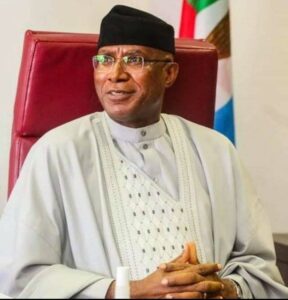2015 :NEWSPAPERS AND THEIR ‘GARGANTUAN’ EDITORS
BY BOBSON GBINIJE
“Even in the common affairs of live,
In love, friendship and marriage,
How little security have we when we
Trust our happiness in the hands of others!”
William Hazlitt (1778-1830) On Living to Oneself
The recherché of professionalism entails the serendipitous admixture of myriad formats of knowledgeability. Hence, every profession has its esoteric jargons. The profession of journalism is not left out in this cauldron of normative standards. But the editor is critically crucial in the newspaper publication industry.
Without slips of prolixity, a newspaper is an alphenstock designed to carry the reader up the mountain of information, entertainment and education etc. It is a daily or weekly publication consisting of folded sheets and containing news, features and advertisements etc. Indeed, a newspaper incarnates the matrix, nexus and praxis of any society. It is the heart of any nation and a good newspaper is a nation talking to itself.
To enhance it’s functionality, mission statement and the core essence of its fundamental objectives, its’ publishers employ people or journalist with multidimensional ambience. But the editor is one employee that stands out with singular diaphaneity. There are many types of editors in any newspaper setting. They are usually categorized and dichotomized along professional or areas of specialization.
It is the duty of the Editor to prepare text for publication by checking, amending, altering and improving its’ accuracy and clarity. It is also the duty of the Editor to ensure that opinions expressed in the newspaper are in congruency and consistent with the Editorial policy, the religious, political, socio-economic and ideological mission statement of the publisher. Indeed, Editors, especially editors in government owned newspapers luxuriate in outright falsehoods, splendiferous theatrics, and propaganda hypes, laced with panegyric histrionics, which smacks of hitleric and Goebbelian antics. They can only mirror – out and not mirror –in, like parrots who repeats words after their masters without understanding them.
There are editors and there are indeed editors. Some editors are coquettish with the government and political leaders and are trapped in conscience vendorization through pecunious inducements. There are also editors in private and government owned newspapers who tell it as it is notwithstanding whose ox is gored.
It is the genre of conscience mortgaging and filthy lucre editors who are slavishly tied to the apron strings of their paymasters that have rubbished the integrity of the profession. At best they are paid hirelings, government area-boys, surrogates and newspaper terrorists. It is this type of negative zeitgeist that propelled essayist Norman Mailer to assert that, “once a newspaper man touches a story, the facts are lost forever, even to the protagonist”.
The empirical testability and presence of corruption in most newspaper newsrooms remains an inviolable truism. Since what is newsworthy is subject to the capricious whimsicality of the ‘gargantuan’ Editor, he as the Alpha and the Omega decides which Reporter and Correspondents’ report should occupy the front page and whatever strategic space is in the newspaper. He could even, under the guise of ‘Newsroom Politics’ discountenance Reporters’ and Correspondents’ report if not bribed. He could also decide to publish articles, letters, opinion and reports of his cultic friends, relations and monetary expectations from government public relations agents for appointments or monetary reward.
It must however be conceded that the mission statement of his newspaper as spelt out by his Publishers, Members of his Editorial Board and his Employers determine to a large extent the oscillatory pull of the editors ideas. After all, the man who pays the piper dictates the tune.
But we are saying furthermore that, notwithstanding all these truisms, the editor of a newspaper can still conduct and manage his submissions in such a manner as to mitigate the odium and the blanket of cerebral manacles in which he is cocooned.
We are asserting here with unambiguous clarity, that the editor must be first and foremost conscience-and-duty-bond to the truth and the general good. What will an editor gain when a society and its leadership are convoluted in the altar of despotism, illegal detention, election rigging, police brutality, assassinations, economic injustice, extra judicial killings, tribalism, bribery and corruption?
It is the bounden duty of the editor as part of the watchdog of society, Member of the forth Estate of the Realm and the conscience of society to condemn these evils in no uncertain terms. Our ‘gargantuan’ Editors must note the admonition of Marcus Cicero “Salus Populi est suprema lex” (the good of the people is the supreme law).
They must note that criticism is an uncompromisable condition of democracy and freedom. Criticism is the hall mark of intellectual discourse, since it provokes argument and argument would, well handled, facilitate the attainment of good resolutions. Again, it is a mere emotive rationalization to expect that because an idea appears so good by its sheer sound or its face value, it should be accepted wholesomely without questioning from our leaders, government agents, publishers and informed members of the public.
The handling of public opinions by most editors must be revolutionized, as most opinions are either edited out of context or not published at all. Every Human Being in any democracy deserves to be heard notwithstanding his communication deficiency. It is in recognition of the importance of public opinion that, Abraham Lincoln said, “with public opinion on its side, nothing can fail with public against it, nothing can succeed.” The facts are sacred and comments free, but most newspaper editors have traditionally been content to state their own views and rely on logic of their arguments, the force of direction and reasonableness of their advocacy to commend their views to the public. But it must go beyond this. Let the truth and altruism be their hallmarks.
Finally, as our inchoate and embryonic democracy metamorphoses into adulthood, the editors of our newspapers have catalytic role to play. They must prove Sidney Haword wrong. He said “an editor is a person employed by a newspaper, whose business it is to separate the wheat from the chaff and to see that the chaff is published” we want to see more righteous indignation, critical and incisive commentaries, satyagrahi- like analysis and avant-gardism against the rot of our political leaders and the society from our editors. It not is life that matters but the courageous we put into it. Wither goeth our Newspaper Editors and the Nigerian Guild of Editors as 2015 elections approaches?.
BOBSON GBINIJE
MANDATE AGAINST POVERTY (MAP)
WARRI 08023250378



